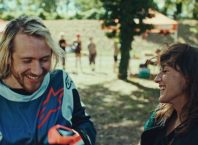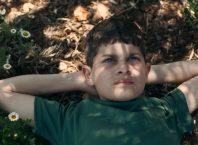Various technical difficulties prevented me from covering the Haifa film festival in real time, but I was actually there. I only saw a fraction of the films I would have liked to have seen, but that fraction contained a few interesting films, and one fascinating one. The latter was Elia Suleiman’s ‘The Time that Remains: A Chronicle of a Present Absentee’, and I will attempt to tackle it on its own in the coming days. For now, here is my take on three other films I saw: ‘9’, ‘Around the Small Mountain’ and ‘Tales from the Golden Age’.
Following my review of ‘District 9’, ‘9’ is another case of a first-time feature director expanding on a short film he made under the auspices of a successful and experienced filmmaker. With ‘District 9’ it was Peter Jackson supporting the young Neil Blomkamp, here it is two filmmakers supporting director Shane Acker- ‘Night Watch’ and ‘Wanted’ director Timur Bekmambetov, along with Tim Burton. The two filmmakers even lend their collaborators to the film- ‘Wanted’ and long-time Burton composer Danny Elfman contributed to the score of this film. Design and story elements clearly reference early Burton films, and Acker shows his producers’ penchant for creating an imagined world, in this computer animated film. And what he’s done with it is make a very strange film.
Initially, the film seems to be headed for adult territory. It’s a post-apocalyptic environment and we are plunged into the story with minimal narration and almost no exposition. The last human being in the vicinity has died. Maybe the last in the world- the kind of geography and history we’re dealing with is barely touched upon. As he dies, a curious being come to life. About a foot tall, with a zipper up his front and a big number 9 on his back, he looks like a boring, mechanical stuffed doll, with big E.T.-ish eyes. In a series of events that is somewhat bewildering (given how little we know about anything in this world), he meets similar beings, names 1, 2, 4, 5, 7 and 8. They are the lone vaguely humanoid (or at least the most anthropomorphized) beings in this world. Their challenge is to survive in the world where humanity’s exploitation of and reliance on technology brought about its extinction. The film’s goals remain obscure for a great deal of its brief (79 minutes) run-time. Is it an adult movie hidden in a children’s adventure tale, or simply a children’s adventure tale?
Despite the specter of humanity’s extinction and the questions about technology, it is very much the latter. The patience it asks regarding its plot is rewarded by boring action sequences (which are utterly uninvolving, given how little we care about the characters) and painful dialogue that is mostly made up of clunky one-liners and speechifying about messages aimed entirely at kids. By the time we find out the Nine’s purpose for existing, I couldn’t care less.
The movie is filled with film references, but instead of embracing them and using them to get information across (as in Duncan Jones’ ‘Moon’, a film I’ll be writing about in the next few days), they are haphazardly thrown together to create something that resembles a plot (perhaps they thought that only by referencing other, better, sci-fi movies would the adults remain interested). The opening is ‘Edward Scissorhands’ meets ‘Dark City’, the landscape is ‘Saving Private Ryan’ meets ‘Lord of The Rings’, the villain has a big red light that can be either Hal 9000 or the eye of Mordor. Probably the latter, as 9 (the character) is voiced by Frodo himself, Elijah wood. Some good actors have lent their voice to the film, all to little effect. Even Martin Landau and Christopher Plummer can’t save the insipid dialogue of the script.
The film looks good, if one can ignore the blandly designed characters. But who cares? There are enough good looking animated films around that aren’t nearly as annoying as 9.
Now, on an entirely different note…
Of all the major French new-wave directors, Jacques Rivette is probably the least famous. Indeed, before the most recent film, I myself had only seen two of his films to date- ‘Paris is Ours’ (1960) and ‘Celine & Julie go boating’ (1974). This being the case, I am unfortunately oblivious of the relationship of his most recent film, ‘Around the Small Mountain’, to his body of work. I’ve read from fans of Rivette that this is a meditation on his latter-day films and that this film is a fitting swan-song should the frail 81 year-old director be unable to complete another film. It is a small film and a short one (84 minutes, where Rivette has made films over 10 hours long).
It stars Jane Birkin and Sergio Castellitto as Kate and Vittorio, respectively. Kate was an acrobat in her family’s traveling circus until certain events caused her to leave. Now, 15 years later, after her father’s death, she decides to rejoin the troupe. Vittorio is first seen in the film’s opening, where he silently assists Kate with some car trouble, and proceeds to insinuate himself in the surroundings of the circus on the troupe. We know little about either of them.
For the few days we see them here, Kate is tense, polite and distant with everyone, while Vittorio is charming, easy-going and fascinated by what he sees in the circus and its performers. Kate is in a deep melancholy, resigned to her sadness over the past. Vittorio barely seems to have a past- he lives in the moment, takes life as it comes. Vittorio’s natural state is peaceful lounging in a seated position, but whenever the opportunity for interest presents itself, he leaps decisively and gracefully into action. And he is currently intent on figuring out and curing Kate’s resignation from life.
Rivette pits the two opposites against each other- the human and relatable pessimism of Kate does its best to reject the boundless enthusiasm of Vittorio, who embodies optimism. It’s not revelatory, but it is profoundly felt, and even as someone with very little experience with Rivette, I was deeply moved by the possibilities for human connection he believes in at least enough to present, even without entirely surrendering to. It’s a sweet melancholy, and would make for a wonderful double-feature with Jan Troell’s ‘Everlasting Moments’ from earlier in the year.
‘Tales from the Golden Age’ is a Romanian collection of five short films, set in the sarcastically named ‘Golden Age’ of Romania- the last decade of Communism in the country. Christian Mongiu, the director of the ecstatically received ‘4 Months, 3 Weeks, 2 Days’, produced the film, wrote all five stories, and directed one of them. Each of the films is a vignette, all examining different absurd situations related to Communism in 80’s Romania (the general tone is not unlike that of 2003’s ‘Goodbye Lenin’, set in Germany around the same time). Like any collection of short-stories, some are better than others. I particularly enjoyed the first two films –’The Legend o the Official Visit’ and ‘The Legend of the Party Photographer’. Both are over-the-top and very funny looks at ridiculous bureaucratic situations. The first is about a small town trying to impress party officials by moving dirt piles around, replacing the local cows with sheep, trying to find doves instead of pigeons and other like-minded details. It ends in a symbolic and funny bit of slapstick.
The second film is about the pains the party’s official paper goes to in order to make the party secretary look impressive in photographs. Its punch-line is a bit more pointed, about the banality of evil. The other three films were less successful, getting too serious and grave (‘The Legend of the Chicken Driver’), too broad (‘The Legend of the Zealous Activist’, which happens to be the best looking film of the lot), or simply not doing enough with a good concept (‘The Legend of the Air-Sellers’).
I was less than enthralled with the film as a whole, but I was still pleasantly surprised with it. I’ve been rather more ambivalent about new Romanian cinema than most writers. In particular, I found 4 months, 3 Weeks, 2 Days to be a far less important film than the near-unanimous praise pegged it. There is an unresolved nihilism on display in some of these films that I have a difficult time connecting to. They do encourage a certain empathy with their character that is valuable, but they often do so at the expense of joy, or of the artifice that to me is an essential part of film. I was pleasantly surprised by this film because its humor is not only of the jet-black eastern-Europeans variety. It is also that- there is a great and real desperation in every scene of the film. But the humor is also (at times) of the pure, life-affirming type. Mongiu has earned his sardonic view of the world, but I’m not terribly interested in a fictional depiction of misery that is unable to acknowledge even the fleeting potential for good, even if that good only exists in a well-composed shot, or a joke that is funny not just because of how absurd existence is, but just because it is. A bunch of grown men on a carousel in the middle of night with no way to stop it is funny here even without the subtext of the desperation of an oppressive regime.





